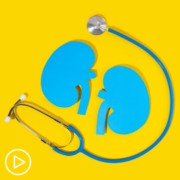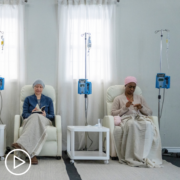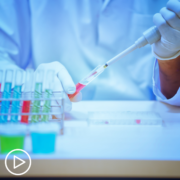What Renal Medullary Carcinoma Treatment Options Are Available?
What Renal Medullary Carcinoma Treatment Options Are Available? from Patient Empowerment Network on Vimeo.
Renal medullary carcinoma (RMC) treatments are starting to expand, but where do things stand? Expert Dr. Nizar Tannir provides an update about current RMC treatment options and his perspective about RMC research and hope for emerging treatments.
Dr. Nizar Tannir is a Professor in the Department of Genitourinary Medical Oncology, Division of Cancer Medicine at The University of Texas MD Anderson Cancer Center.
[ACT]IVATION TIP
“…chemotherapy is good, but we hope to develop more effective therapies in the future…please engage, enroll, participate in clinical trials only through research. We can advance the field and ultimately conquer this devastating disease.“
Download Guide | Descargar Guía
Related Resources:
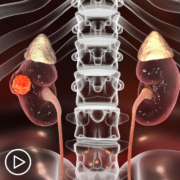
|
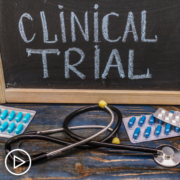
Why Renal Medullary Carcinoma Clinical Trial Participation Is Pivotal |
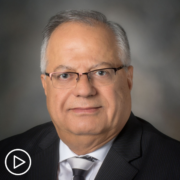
A Renowned Expert Weighs in on the Future of Renal Medullary Carcinoma |
Transcript:
Cora:
What promising treatments are available for patients facing an RMC diagnosis?
Dr. Tannir:
Although RMC carries a guarded prognosis because of its aggressive nature and because of its clarity, we have been able to change this bleak outcome, changed prognosis over the past, I would say decade from back in the ’90s and 2000s early on, patients unfortunately with RMC, unfortunately lived only few months because people didn’t know how to treat it. And it requires the knowledge to build the knowledge, and that’s important infrastructure that really builds the program, that it’s the little things that matter that ultimately in aggregate improves the survival. So chemotherapy is available everywhere, people can get chemotherapy in even small cities, hospitals that have chemotherapy that treat patients with other common cancers like breast cancer and lung cancer and colon cancer.
Chemotherapy is available, but it’s not just having chemotherapy on the shelf and the pharmacy. So there are urologists surgeons that operate on patients with cancer, good hospitals, but it’s not enough and it’s not, you need to put all those things together. It’s like a board, with pieces of the puzzle. You just have to really have the knowledge to put these pieces together, to know when to operate, when not to operate, to know what chemotherapy to give and when to give it. And there are advances. We are making those advances. But chemotherapy remains the mainstay for now in 2023 and in 2022. And prior, for the last several years, as long as I’ve been at MD Anderson, we came up with the first-line chemotherapy regimen.
That has been our first-line backbone for treatment of patients with RMC and have been successful in it. Unfortunately, not every patient responds to it, but a good number of patients will respond to it, and we can build on that chemotherapy with further chemotherapy. And we have some newer therapies that we are developing. We have some clinical trials. I am very hopeful and optimistic about the future, but chemotherapy remains the mainstay for first line therapy. So a patient with RMC needs to start chemotherapy, there are two drugs that we’ve used and I’ve used them on Herman as you know, Taxol or paclitaxel, and carboplatin. Unfortunately, not every patient with RMC is going to benefit from this for a long time, but this will be the start.
I think it’s very important for a patient with RMC that has specially if they have spread of their cancer outside the kidney, to not have the surgery up front, that’s not wise it is important to start with the chemotherapy only after the patient achieves an excellent response to the chemotherapy where you controlled the disease in these organs or other sites outside the kidney, then one can proceed and remove the kidney as we did with Herman, we gave him the chemotherapy first, he had a fantastic response. We were able to remove his right kidney, and there was a very minute focus of residual cancer in the right kidney, I remember, but even then, we had to go back and give him chemotherapy afterwards.
But beyond chemotherapy, we have newer therapies that we are exploring. Dr. Msaouel in my group on my team has been leading some of these trials, and we believe that we have some key targets that we have identified that are relevant for RMC that we are developing novel, we hope more effective therapies in the future, only through clinical trials. We are going to make progress. So my activation tip is chemotherapy is good, but we hope to develop more effective therapies in the future. So my activation tip is please engage, enroll, participate in clinical trials only through research. We can advance the field and ultimately conquer this devastating disease.
Share Your Feedback:
Create your own user feedback survey

